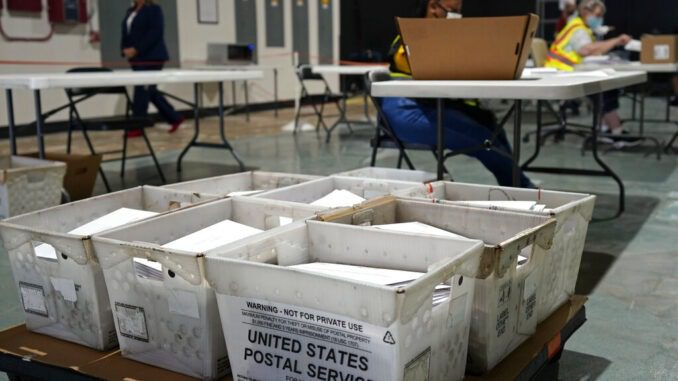
North Carolina issued new guidance Monday for counties to proceed with dealing with more than 10,000 deficient absentee ballots, which have been in limbo because of ongoing court battles over a witness requirement for voting by mail.
The State Board of Elections issued a directive telling counties to immediately resume notifying voters whose ballots arrive with a range of deficiencies on how to fix the problem or start the process over. The memo tells counties that voters who mail in ballots without a witness signature must fill out a new ballot and have it witnessed again. But the state board said counties can allow voters to fix more minor problems such as a missing witness address by returning a signed affidavit.
County boards should immediately begin contacting voters whose ballots were set aside due to pending court battles and enter information about the ballots into a state database, according to an email sent Monday by the board’s general counsel, Katelyn Love.
The state board had told counties on Oct. 4 to set aside ballots with various deficiencies and take no further action pending proceedings in a tangle of state and federal lawsuits over absentee ballot rules. A key issue was implementation of a state law requiring that absentee voters have another adult witness their ballot and sign the outer envelope.
The state board was sued by voting rights advocates over absentee requirements, prompting a late September revision that eased rules for fixing ballots with incomplete witness information. But state and national Republican leaders then went to court to challenge the revisions, arguing that those would dilute the voices of voters who had already cast ballots under prior rules that were stricter.
As of Friday, the state board estimated there were at least 10,700 absentee ballots with problems that needed to be fixed, but those voters couldn’t be contacted because of freezes put in place due to the court fights, according to court documents. The number of affected ballots could be much higher because counties had been instructed not to enter the deficient ballots into the state database.
Under Monday’s update to the absentee ballot rules, problems that can be fixed by returning an affidavit —- but without starting a new ballot over — also include a witness or voter signature in the wrong place, a missing voter signature or a failure of the witness to print his or her name. Counties must notify voters of such problems and send them a form known as a cure certification by mail or email. Counties are told to call the voters if their number, but not their email, is on file.
U.S. District Judge William Osteen ruled last week that the state could not accept absentee ballots returned without a witness signature. He declined, however, to force the state to shorten the period during which county boards can accept mail-in ballots after Election Day that were postmarked by Nov. 3. The state board made the deadline Nov. 12, lengthening the period from three to nine days, as part of the late September settlement.
A court fight over how long absentee by-mail ballots can be accepted is still pending in a federal appeals court. A state appeals court declined to intervene Monday on the absentee ballot deadline.
North Carolina Attorney General Josh Stein, a Democrat whose office represents the state Elections Board, said on Twitter that letting county boards move forward with processing deficient ballots will help “make sure every eligible vote counts.”
But state Senate leader Phil Berger, a Republican who had gone to court over the election board’s late September rule revisions, blamed Democrats for the situation, saying: “The chaos over the past month was entirely avoidable.”



